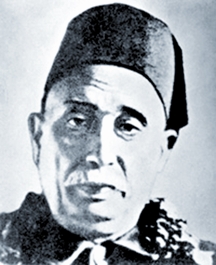Kaikobad

Kaikobad (1857-1951) epic poet and writer. Kaikobad was the pen name of Mohammad Kazem Ali Qureshi. He was born in the village of Agla under nawabganj thana in the district of dhaka in 1857, son of Shahamatullah Al Qureshi, a lawyer at the Dhaka District Judge Court.
Kaikobad studied at pogose school and st gregory’s school in Dhaka. He then went to Dhaka Madrasah where he studied up to the Entrance Examination. However, he did not sit for the examinations, returning back home to his native village to take up the job of a postmaster, where he worked until his retirement. In 1932, he presided over the main session of the Bangiya Muslim Sahitya Sammelan in Kolkata.
Kaikobad revealed his poetic genius early. His Birahabilap was published in 1870, when he was about thirteen.
Kaikobad was influenced by the epics written by hemchandra banerjee and nabinchandra sen and, in 1904, published mahashmashan (The Great Crematorium), based on the Third Panipat War.
The epic, which shows the destructive nature of war in both victory and defeat, is considered to be his masterpiece.
Kaikobad's other works include Kusumakanan (1873), Ashrumala (1895), Shivamandir (1922), Amiyadhara (1923), Shmashanabhasma (1924) and Maharram Sharif (1932). His Premer Phul (1970), Premer Vani (1970), Prem Parijat (1970), Mandakini Dhara (1971) and Gauchh Paker Premer Kuvja (1979) were published posthumously. The bangla academy published his complete works as Kaikobad Rachanabali (Writings of Kaikobad) in three volumes (1994-95).
Kaikobad's literary inspiration was derived from his desire to make the backward Muslims aware of their rich tradition and heritage and thereby help restore their national self-confidence. However, he also wrote on religious issues of both Hindus and Muslims. For his literary achievements, the Nikhil Bharat Sahitya Sangha awarded him the titles of 'Kavyabhusan', 'Vidyabhusan' and 'Sahityaratna'. He died on 21 July 1951 and was buried at the Azimpur Graveyard in Dhaka. [Wakil Ahmed]
